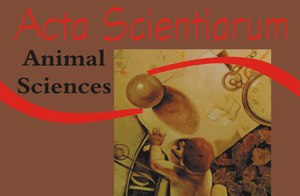ABSTRACT.
The semi-arid region of Brazil represents approximately 57% of the northeastern territory. The main economic activity in this region is agriculture and livestock, in most cases, using traditional technologies. However, there is little published information currently available on cattle-raising in this part of Brazil. The objective of this study was to estimate genetic parameters and trends for productive and reproductive traits of Nellore cattle raised in semi-arid region of northeastern Brazil. Data were collected on weight-adjusted at 205 (W205), 365 (W365) and 550 (W550) days of life, age at first calving (AFC), calving interval (CI) and scrotal circumference (SC) at 550 days of life of cattle born between 1965 and 2011. Estimates of covariance and variance were obtained through univariate analysis using a Gibbs sampler. The estimated coefficients of heritability (mode) were 0.27 (W205), 0.36 (W365) and 0.39 (W550), 0.37 (SC), 0.22 (AFC) and 0.03 (CI). Little or no gain from selection is apparent in the genetic trend analysis over the 45 years of the study. However, environmental improvement has allowed phenotypic progress in growth traits and age at first age calving.
Keywords:
age at first calving; genetic progress; genetic parameters; heritability.

 Thumbnail
Thumbnail



